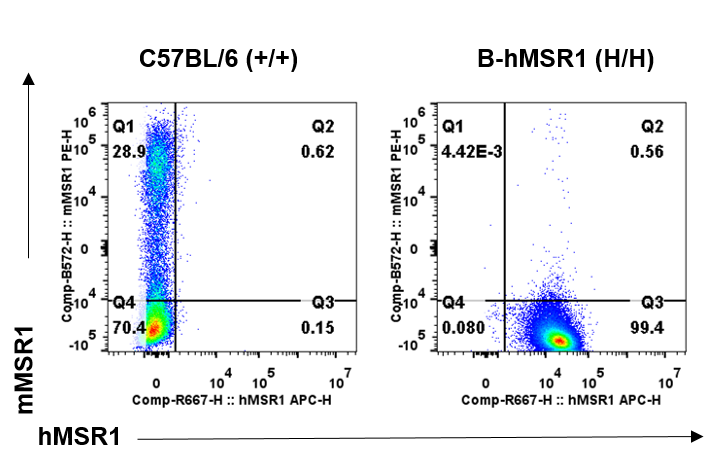Description
- Background: The MSR1 gene(CD204) encodes a predominantly macrophage-expressed scavenger receptor. Its core function is to recognize and internalize diverse "non-self" and "modified self" molecules (especially oxLDL), mediating pathogen clearance, efferocytosis, homeostasis, and inflammation regulation. It plays a pivotal role in foam cell formation during atherosclerosis and is a critical marker for Tumor-Associated Macrophages (TAMs), contributing to an immune-suppressive tumor microenvironment and poor prognosis. Thus, MSR1 is essential for innate immunity but also acts as a pathological driver and potential therapeutic target in major diseases like cardiovascular disease, cancer, and neurodegenerative disorders.
- Targeting strategy: The exons 4-10 of mouse Msr1 gene that encode extracellular domain are replaced by human counterparts in B-hMSR1 mice. The genomic region of mouse Msr1 gene that encodes transmembrane domain and cytoplasmic portion is retained. The promoter, 5’UTR and 3’UTR region of the mouse gene are also retained. The chimeric MSR1 expression is driven by endogenous mouse Msr1 promoter, while mouse Msr1 gene transcription and translation will be disrupted.
- Validation: Human MSR1 protein were detected in the B-hMSR1 mice but not in C57BL/6 mice.
- Application: Tumor cell lines inoculated in B-hMSR1 mice can be used to study the in vivo efficacy and safety evaluation of antibody drugs
Protein expression analysis in peritoneal lavage fluid
Strain specific MSR1 expression analysis in homozygous B-hMSR1 mice by flow cytometry. Peritoneal lavage fluid were collected from wild-type C57BL/6 mice (+/+) and homozygous B-hMSR1 mice (H/H), and analyzed by flow cytometry with species-specific anti-mouse MSR1 antibody (Biolegend, 154709), and anti-human MSR1 antibody (Biolegend, 371905). Mouse MSR1 was only detectable in wild-type C57BL/6 mice. Human MSR1 was exclusively detectable in homozygous B-hMSR1 mice.
* When publishing results obtained using this animal model, please acknowledge the source as follows: The animal model [B-hMSR1 mice] (Cat# 111343) was purchased from Biocytogen.

